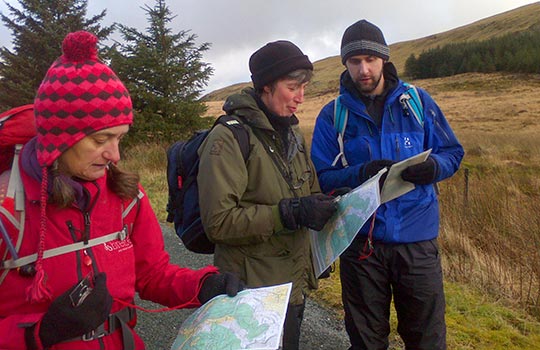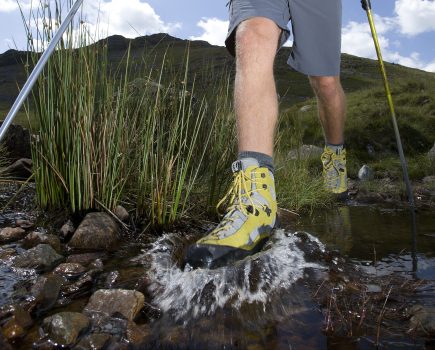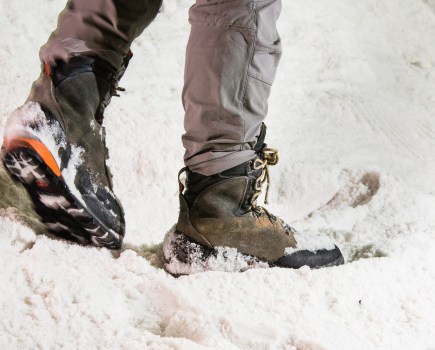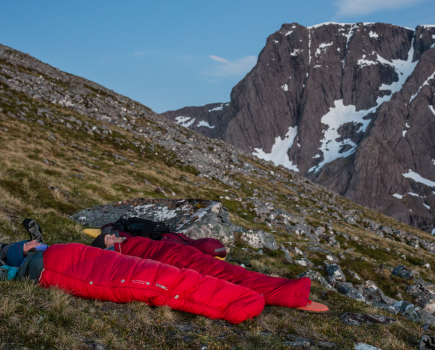Graham Uney explains what you can learn in two new programmes launched in the UK
Learning skills to keep you safe in the UK hills and mountains has always been a hit and miss affair. For many folk heading into the hills, it’s a case of either picking up tips and skills from friends, from books and magazines like The Great Outdoors, or just working it out as they go along. For some of us that is enough, but given the current popularity of hill-based activities, it’s hardly surprising that our volunteer mountain rescue teams are kept so busy – in part because skills such as navigation, avoiding hazards, understanding mountain weather and knowing how to get help in an emergency are not fully understood by a significant proportion of hill-goers.
Over the last 50 years the national governing body for mountain activities in the UK, Mountain Training, has achieved great successes in training those seeking a career in the mountains. But award schemes such as the Mountain Leader (ML) award have also been used by people not necessarily looking for a career in the hills, but who wanted to learn the techniques covered by such courses without being that bothered about the ‘leadership’ aspect of the qualification.
And who could blame them? Do an ML training course, and you’ll learn lots of really useful techniques to keep you safe on a personal level. But that’s not really what these award schemes were set up for. They are essentially leadership training courses for those who are intending to take others out into the hills, whether on a professional or casual basis.
Now, Mountain Training have, as part of their 50th year celebrations, launched a brand new training programme – the Hill and Mountain Skills scheme. These two-day courses cover a wide range of topics and are aimed squarely at those looking to
develop their own personal hill and mountain skills. New providers for the scheme have been selected all over the country, from Cornwall up into the Scottish Highlands, and the registrations for participants to sign up for courses opened on 1 April.
Over the last 20 years I’ve worked in the mountains throughout Britain, running guided mountain walks, and offering a variety of skills courses to walkers and mountaineers. I’ve rarely had a week go by when I’ve not come across people out in the hills who have been lost, or found themselves on intimidating terrain and are not sure what to do about it. Now, based in Wales, I’m proud to be among those first providers of the new Hill and Mountain Skills programme.
The Hill Skills course is aimed at complete beginners, while the Mountain Skills course is targeted at those with experience of being out in the hills and mountains and covers more technical ground. We’ll be running our Mountain Skills course on the higher ranges of south Snowdonia, where participants can practise more challenging navigation off the beaten track on rougher and rockier terrain than the Berywn and Dyfi hills where we’ll be doing the Hill Skills courses.
Equivalent programmes will be run by qualified mountain professionals across the UK’s key hillwalking areas, and details of the various providers will be made available through the Mountain Training website. The emphasis on these courses is very much on having a good time in the hills, and you won’t be assessed as part of the course. But every opportunity will be taken to reach the summit!
SUBJECTS COVERED ON THE COURSES
The syllabus for both the Hill Skills and the Mountain Skills course are similar, but take into account the more challenging terrain used for the Mountain Skills training.
• Planning: route planning, use of guidebooks and online resources, health and fitness considerations
• Walking skills: walking techniques, managing pace, nutrition, movement over rough ground
• Clothing and equipment: clothing, footwear and equipment selection, additional emergency equipment
• Weather: effects of weather in the mountains, obtaining weather forecasts
• Navigation: use of different maps and scales and their features and symbols, measuring distances, grid references, relocation, compass selection, GPS
• Environmental knowledge: understanding the impact of humans in the hills, understanding the mountain environment, the role of different walking organisations
• Hazards and emergencyprocedures: identifying hazards, managing risk, calling for help, mountain rescue
PUTTING YOUR NEW SKILLS INTO PRACTICE
Because you’ll be drawing on the knowledge of an experienced instructor when you take one of these courses,wherever you choose to do it, you canexpect to learn a range of interesting and useful facts and tips. You’ll consider questions such as…
• What would you do if your map blew away on a mountain?
• If it’s 2ºC in the valley, do you know how cold it will be at the summit?
• Do you know how to measure a distance accurately while walking?
• You’re backpacking and have come to an unfordable river. Do you know what to do next?
HOW TO GET ON A COURSE
Before booking a course with a provider you must register with Mountain Training. You can do this online at mountain-training.org/walking/ awards/hill-and-mountain-skills. You’ll get a candidate number. When you book on either a Hill or Mountain Skills course with a provider, you’ll need to tell them that number. Then you can secure your place on a course and look forward to adding to your outdoor skills.
Through his company Wild Walks Wales, Graham Uney will be offering both the Hill and Mountain Skills courses throughout south Snowdonia, and also in the Berwyn hills.
wildwalkswales (Email: wildwalkswales@gmail.com; 07720 169191).
Words and photos: Graham Uney







